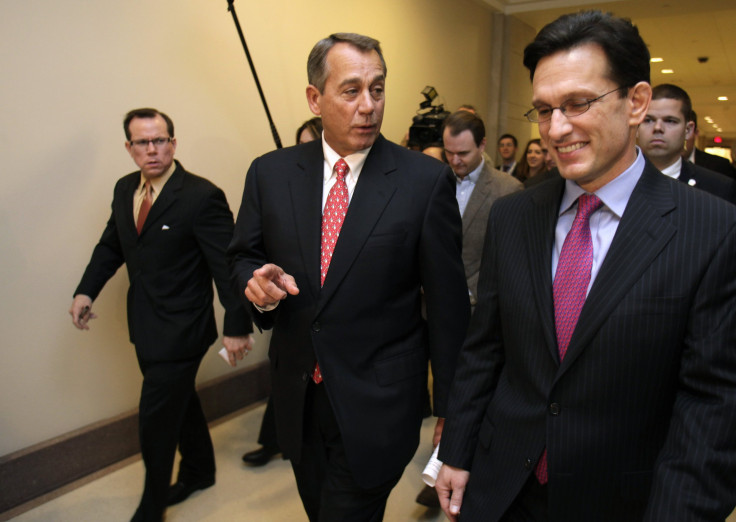Immigration Reform 2013: Why Is Boehner Avoiding The Issue Of Pathway To Citizenship?

House Speaker John Boehner, R-Ohio, may be cautiously picking his battles with his caucus -- and that could be the reason he has yet to announce his position on immigration reform, especially a comprehensive package that includes a pathway to citizenship, which Boehner is refusing to say whether he personally supports.
His job, he says, is to facilitate the discussion and a process for moving forward on the issue. And as the leader of a party with members holding different philosophies on immigration, Boehner has made it clear he is not about to complicate his own work.
“If I come out and say I’m for this and I’m for that, all I’m doing is making my job harder,” Boehner said on CBS “Face the Nation” on Sunday. “My job is to -- as the leader of the House, is to facilitate this conversation, this process, that involves members on both sides of the aisle, involves the American people, and when they can see us moving in a deliberative, step-by-step commonsense way.”
While everyone in Boehner's caucus seems to agree that more should be done on the issue of border security and law enforcement, there isn't much consensus on what to do with the 11 million undocumented immigrants. The Senate thinks a 13-year path to citizenship is a tough but fair road and has put it in its comprehensive immigration bill. But House Republicans are far from sold on that approach, and their leader is not yet ready to make a decision for them. Clearly, Boehner is thinking like the politician he is. To stick his neck out now is dangerous. The short-term benefits at this point -- keeping a Republican majority in the House next year and possibly retaining the speakership -- are looking much sweeter right now than the problem of returning a Republican to the White House in 2016, something that would demand immigration reform to please Latino voters. Boehner is avoiding the issue, but for how much longer can he do that?
“He’s got tremendous say but maybe trying to dissect the issue a little bit, get the border security done first and then we talk about pathway to citizenship,” said Republican strategist Robert Haus of PolicyWorks. “In this current situation [amnesty is] almost a code phrase, if you will, and I think that is why he is trying to stay away from that element of the discussion at this time.”
Some Republicans abhor the idea of granting citizenship to immigrants who came to the U.S. illegally. In fact, there has been a history of anti-immigrant rhetoric, remnants of which have been passed over into current legislation. As far back as 2002, during the Bush years, Republicans have been pushing the idea of having local and state law enforcement officials enforce federal immigration laws. This year, a House committee passed a proposed law known as the SAFE Act with a similar premise.
“Boehner worries about his leadership position because he’s getting a lot of pressure from conservatives on immigration in the House, who may be concerned about the short-term defeat in the primary if they support a path to citizenship,” said Karthick Ramakrishnan, associate professor of political science at University of California, Riverside. “So that’s mostly what’s driving this.”
There is talk of a bill that would provide legal status to children brought here illegally. However, legalization with no citizenship could be a deal-breaker in Latinos’ eyes, Ramakrishnan said.
“Most Latino voters are actually native-born citizens. They are not foreign born, and they pay attention to how Latinos are being talked about and treated,” he added. “I think that’s the thing they have to watch out for instead of worrying what might happen 10 to 20 years down the road. They need to start worrying about in the next five to 10 years.”
But if Boehner knows that there are political benefits to immigration reform, why is he allowing Republicans to write bills containing ideas that have for at least a decade proven unpopular across America?
He’s waiting to see how the complicated and emotional process plays out, Haus said.
“I think to his credit he is allowing this process to work rather than putting his foot down demanding that it be x, y or z,” he added. “He may very well be trying to allow it to percolate up rather than pushing it from top down.”
“You can look at it that he’s got no wiggle room or he’s just going to let it take its course. Once they decide where the chips are going to fall then they push it full force,” Haus said. “There is a point at which you’ve let the process operate and leadership then demands that you push a direction, right? If it is to ultimately get addressed, then leadership will have to exert some will if the process if languishing. Hopefully, it doesn’t languish too much longer and if it does, then those leaders will be forced to make a decision and put their foot down.”
© Copyright IBTimes 2025. All rights reserved.






















